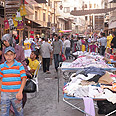
The streets in the Aleppo neighborhood of Hannano are piled high with garbage. Flies buzz around putrid bags that extend farther than the eye can see. The refuse has not been collected for months nor are there any plans to do so. Garbage collection is merely another casualty in war that has pulverized everything in this country.
Throughout rebel controlled Syria, state services have ceased only to be replaced with hardships. From running water to electricity, services taken for granted have stopped operating. Staples such as medicine and baby formula are hard to come by.
Related stories:
- Sources: Jordan drill in preparation for Syria conflict
- US to Russia: Selling S-300 missiles to Syria – mistake
- Fears grow of a foreign-fueled arms race in Syria
In the markets of Aleppo, fruits and vegetables are still available in ample supply. But a society ravaged by two years of war can barely afford to purchase basic staples. Worse, the perils in bringing the food to market coupled with the reduction in state subsidies to purchase it has resulted in prices increases few can afford. Before the revolution, a pack of pita bread sold for 32 cents. Today, that same pack costs 71 cents.
“We have reduced our food purchases and live on sandwiches” technician Sadiq al-Baqir tells The Media Line.
Others who were able to make ends during the cold winter months now lament they have nothing left to draw from. “I haven’t worked in months and can’t buy what we need,” says 34 year old driver Farid Atrash. “We borrowed for a while but the prices are too high."
Some complain that higher food prices are only part of the problem. The real dilemma lies in the skyrocketing cost of fuel. A liter of cooking oil, known locally as mazut, has gone up by more than 200%. “Everything is so expensive,” grumbles 39 year old handyman Muhammad Qardi. “We have nothing to feed the babies.”
Infants have suffered beyond their years. Baby formula supplied by the state no longer reaches rebel controlled areas with any consistency. Even when it does, its high costs and lack of sanitary conditions make it prohibitive to purchase.
“Syrian women do not breast feed,” Dr. Badr Salibi, a 45 year old internist tells The Media Line. “They are having problems shifting to this procedure. Some don’t have the food they need to produce high quality milk. Others are too frightened by the war. As a result, without clean formula, the babies will soon die.”
Harsh living conditions
Many here have become homeless. In provinces such as Idlib, internally displaced persons account for more than 40% of the population according to the United Nations. In Aleppo, more than half of the buildings have been destroyed. In the neighborhood of Bustan al-Basha, rows of edifices have been reduced to rubble. Clothes float in a ruddy pool of water that has consumed the staircase of an apartment. No one lives in these unlivable structures. When the quarter was transformed into a front line between regime soldiers and the rebels, residents fled.
Some moved in with relatives. Others sought shelter in Turkey and the refugee camps there. But the poorest did not have the means to travel and merely squat in buildings in safer parts of town. “I cannot take my family to Killis (in Turkey),” explains 52 year old Wisam Salim. “We have heard horrible stories about it. So we found an apartment someone abandoned. It’s nice. There just isn’t any electricity.”
The lack of electricity paralyzes Syria’s commercial capital. Some areas have been without power since the rebels entered Aleppo last July. Others enjoy sporadic bursts before it is cut. The wealthier have purchased generators. But the poor – and they are the ones who largely remain – live in darkness cut off from the world. “I have not viewed a television in six months,” reveals 63 year old watch repairman Ahmad Lawzi. “I know nothing beyond the war in the city.”
With the opposition shuttling between Western capitals, none of its leaders have devised a plan to create any form of government to manage the disaster Aleppo has become. Both rebels and opposition leaders seem content to allow the city to sink further into the darkness. As they do so, the beacon of freedom and progress the revolution pledged appears dimmer than ever.
Article writted by Michel Stors, courtesy of The Media Line
- Receive Ynetnews updates
directly to your desktop















